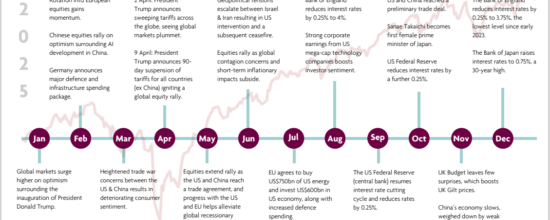Market Update: Fed’s pause keeps pressure on markets
To download the PDF click here.
With the pace of inflation fading, the US Federal Reserve kept interest rates at the same level for the second time this year, which is a sign that the hiking cycle may soon reach its peak.
It was a mixed month for markets with stocks and bonds struggling after the US Federal Reserve (Fed) signalled interest rates would be higher for longer. After a two-day meeting, the Fed announced its federal funds rate would remain in the range of 5.25% to 5.5% – the second time this year the central bank has left them unchanged. Fed policymakers have suggested they could still be lifted one more time this year to a range of 5.5% and 5.75%.
US inflation accelerated in August for the second straight month, as a sharp rise in energy prices pushed up prices towards the end of the summer. Consumer prices rose by 3.7% year-on-year, up from 3.2% in July. However, core inflation – which strips out volatile food and energy prices – slowed to 4.3% from 4.7% for the 12 months ending in August, its slowest pace since September 2021.
After almost 18 months of rising rates, the labour market is beginning to cool, with unemployment rising to 3.8% in August, from 3.5% in July. Employers added 187,000 jobs, up from 157,000 in July, while average hourly earnings rose 0.2% after increasing 0.4% in July.
Bank of England keeps rates on hold
The pound fell to its lowest since March, while UK stocks outperformed the wider market after the Bank of England kept interest rates on hold at 5.25%. It is the first time the Bank has paused after 14 consecutive increases, bringing relief to mortgage borrowers.
Slowing food prices helped drive an unexpected fall in UK inflation in August, which marked the sixth straight drop in the headline rate. Inflation fell to 6.7%, down from 6.8% in July, in the latest sign the Bank’s policies seem to be working.
Despite a slowing jobs market, wages are rising faster than the rate of inflation. UK unemployment rose by 159,000 in the last quarter, taking the jobless total up to 1.5 million. Meanwhile, annual growth in average pay, excluding bonuses, remained at 7.8% – the highest rate since comparable records began in 2001.
ECB in the doldrums and Asia perks up
European stocks had their strongest day in six months after the European Central Bank (ECB) suggested its latest rate hike may be its last. The ECB pressed on with its fight against high inflation by raising its key rate for the tenth time in a row to 4% from 3.75%. Inflation in the euro area slowed to 5.2% in August, down from 5.3% the previous month. This is a substantial fall from the 10.6% peak last October.
The economic outlook for the region remains downbeat. The major economies – Germany, France, Italy and Spain – saw shrinking activity in August in the services sector, despite a strong summer of tourism. This comes on top of a slowdown in global manufacturing that has hit Germany, Europe’s biggest economy, particularly hard.
Meanwhile, Asian shares rose after China reported its economy showed signs of stabilising. Despite a slow start to the year, retail sales picked up and industrial productivity increased, which is a sign the Chinese economy may be breaking out of its post-pandemic malaise.



